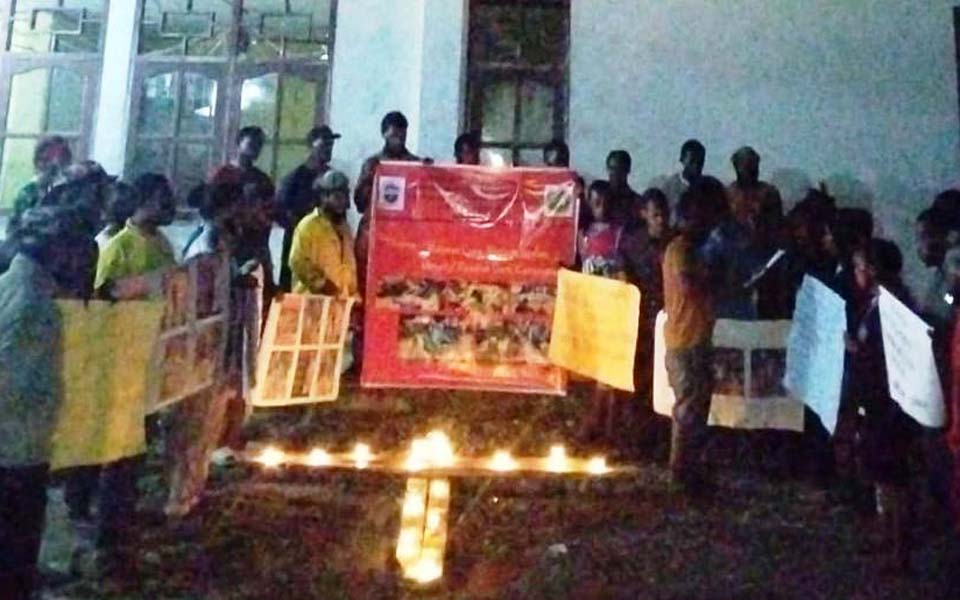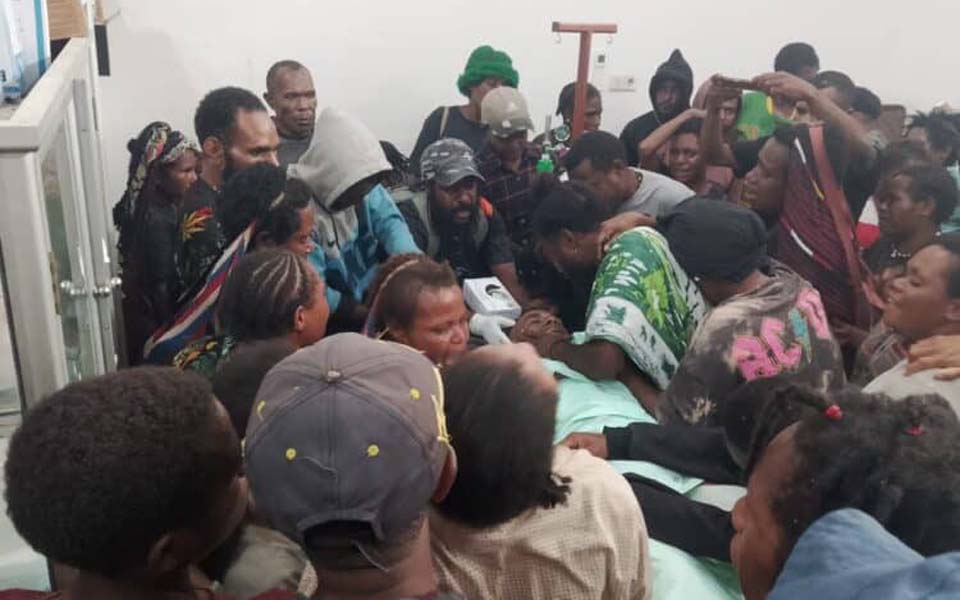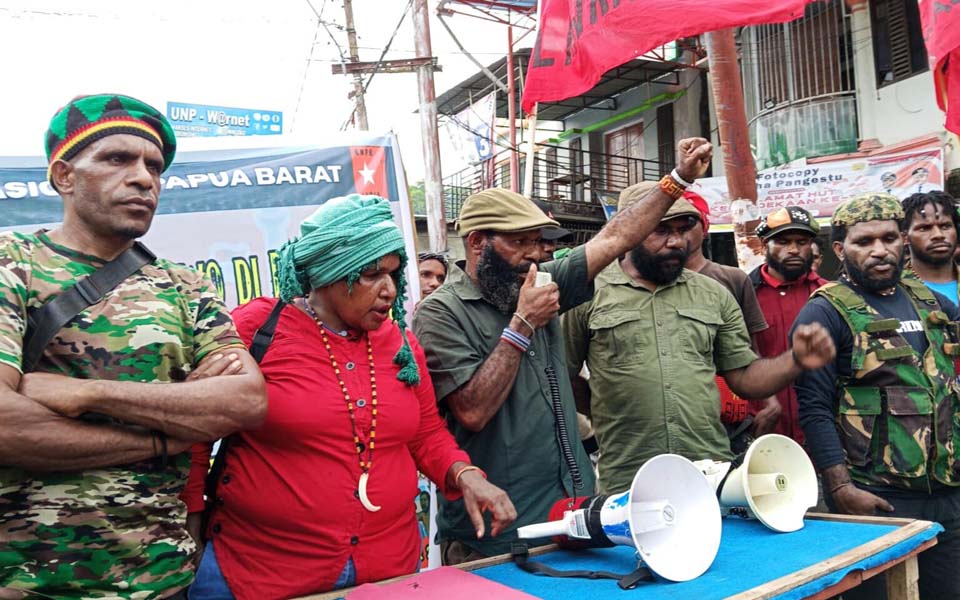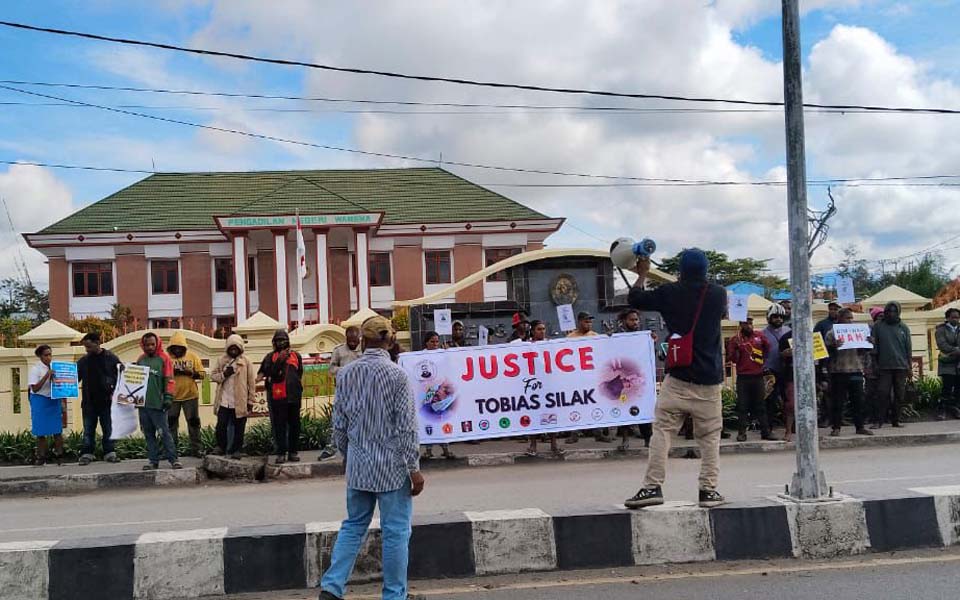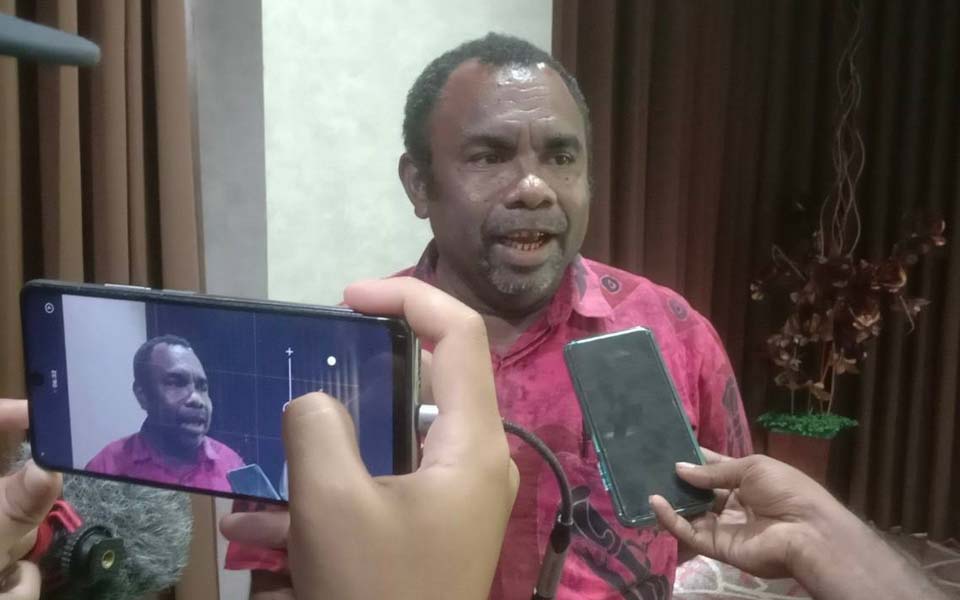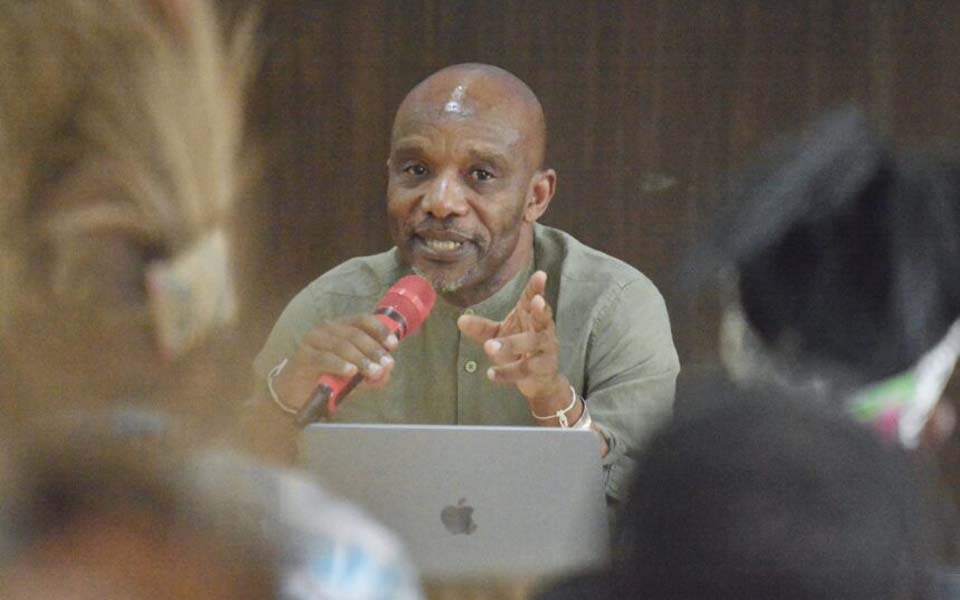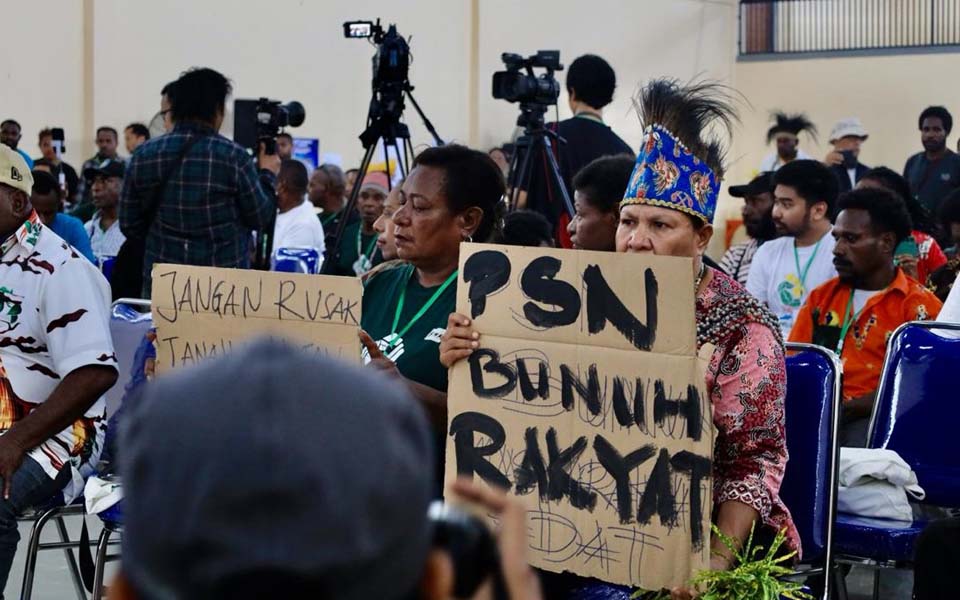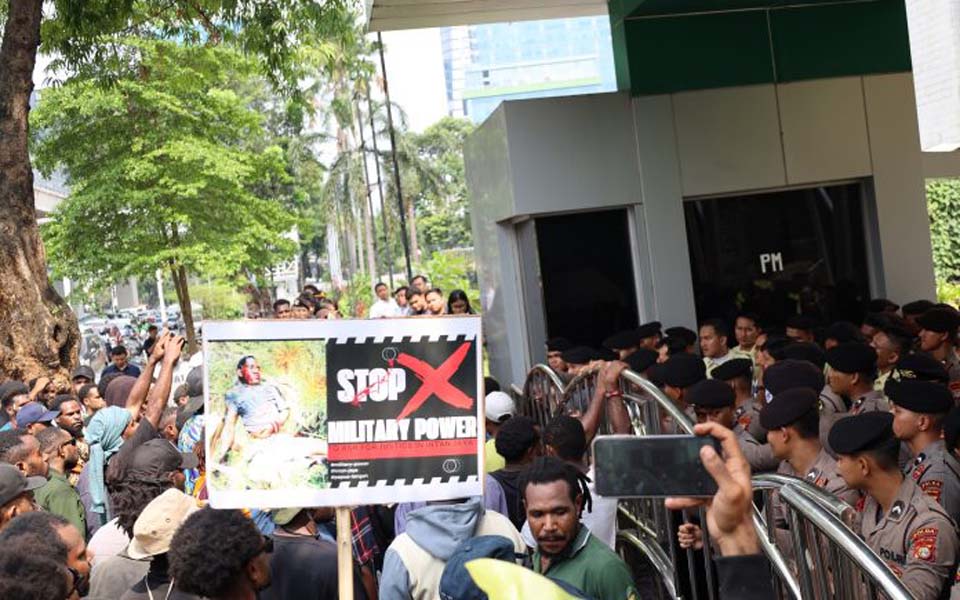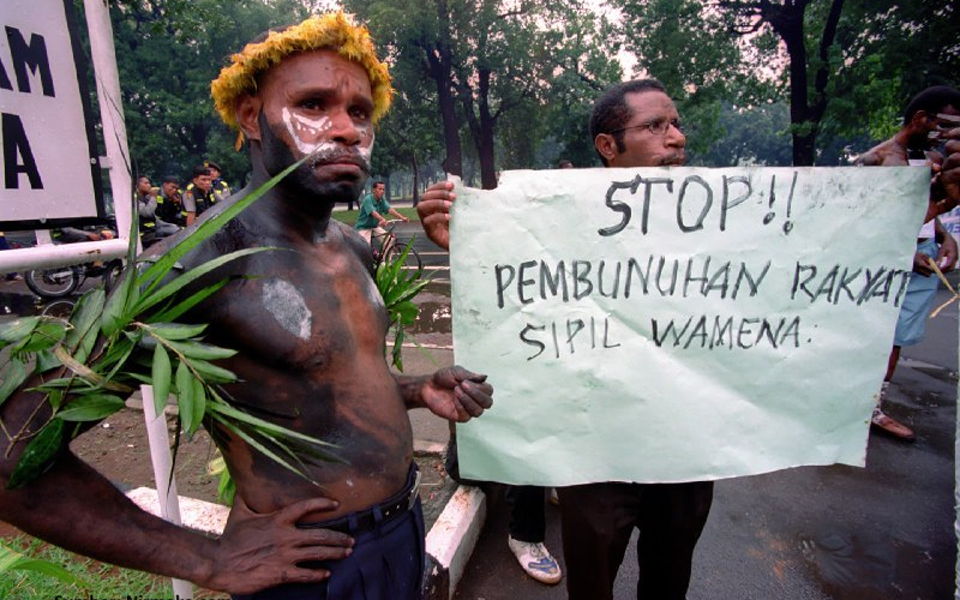Jayapura – The witnesses testimonies by Polri (Indonesian police officers) that were presented during the hearings into the 2014 Paniai massacre case at the Makassar District Court in South Sulawesi on Wednesday September 28, reinforce the grounds for the Attorney General and the court not to just prosecute a single defendant.
This is also in accordance with the identification of the perpetrators by the National Human Rights Commission (Komnas HAM).
Amnesty International Indonesia Executive Director Usman Hamid says that after monitoring two of the court hearings, in his view the process has not proceeded in an optimal manner.
Aside from only four out of 12 witnesses requested by the public prosecutor's (JPU) team appearing in court, there was not one civilian witness presented.
The four witnesses – which all had police backgrounds – were First Brigadiers Andi Richo Amir and Abner Onesimus Windesi, Chief Brigadier Riddo Bagaray and Second Deputy Police Inspector Haile ST Wambrauw.
The hearing schedule was also hampered because copies of the case documents, including the police investigation reports on the witnesses, had not been received by the defendant and their team of lawyers.
"These facts show that it is appropriate to question the Attorney General's seriousness [in trying this case]", said Hamid on Monday October 3.
Hamid also believes that the prosecution team did not adequately try to prove the elements of a systematic and widespread crime which is a key element of Article 9 on humanitarian crimes as regulated under Law Number 26/2000 on Human Rights Courts.
This could be seen from the first hearing when the prosecution presented the indictment, which departed from the concept of the event and the concept of a gross human rights violation.
This view was reinforced during the second hearing when there was no comprehensive discussion about the Aman Matoa V operation which served as a background to the incident in the Komnas HAM investigation report.
During the hearing in which the witnesses were questioned, Hamid noted that the testimonies cited two other perpetrators that were directly involved in the Paniai incident.
This emerged from the testimony of the first witness, First Brigadiers Andi Richo Amir, who mentioned the name Gatot (a Provost member) who shot a person dead in front of the Paniai sub-district military command (Koramil) and Jusman (a TNI member) who stabbed a person to death.
Based on this testimony and the results of the Komnas HAM investigation, Hamid said that there were at least three problems with the second hearing into the Paniai case.
First, the prosecutor was not serious or did not show that they sided with the victims and the public over the case.
Second, Human Rights Courts are obliged to dig into the facts from other parties other than the narrative which is developed by witnesses presented by the prosecution.
Third, Human Rights Courts are obliged to follow up on testimonies and cite the names of other alleged perpetrators for further questioning who could be held liable.
In a press release on September 21, the 2014 Bloody Paniai Monitoring Civil Society Coalition urged the Attorney General to immediately investigate all of the individuals, other than sole defendant in the case, retired Major Isak Sattu (IS), who were directly liable or had command responsibility, and bring them before the courts.
According to the coalition, the indictment of a sole defendant in the construction of the 2014 Paniai case as a crime against humanity that occurred through "a widespread or systematic attack" and that he knew the attack was directed directly against the civilian population, is inappropriate because it certainly must have involved more than one perpetrator.
Based on international law and standards which apply in crimes against humanity, it clearly states that both those who have command responsibility as well as those who directly commit a crime must be held liable and tried in court.
The Komnas HAM investigation into the case divided the perpetrators into several categories, namely field actors, policy makers, effective commanders in the field and perpetrators by omission. Logically, the person in command is responsible for humanitarian crimes committed by their subordinates.
The coalition emphasised that the context of command responsibility does not end with the person who gave the orders, but also includes the accountability of superiors who did not prevent or stop the gross human rights violation from occurring or hand the perpetrators over to the authorised official for investigation, criminal investigation and prosecution as stipulated by Article 42 of the Law Number 26/2000.
"Because of this, it would be appropriate for the indictment not to just target Major Sattu who was the liaison officer at the time, but also target his superiors who in this case are alleged not to have prevented or stopped [the incident from occurring] or handed the perpetrators over to authorised officials", explained Hamid.
Based on these facts, the Coalition says that the impression is that the Attorney General is protecting the perpetrators by not prosecuting others who also very clearly violated human rights.
"It would be appropriate for the prosecutor to also charge the TNI leadership which was responsible and the head of Aman Matoa V Operation as was clearly explained in the Komnas HAM investigation report", said the Coalition.
More than that, the prosecutor should begin by first proving that the field actors committed a humanitarian crime. If the prosecutor starts from the command responsibility, then if supposing the court releases the person with command responsibility, then the field actors will automatically not be then indicted by the prosecutor.
The Coalition again reminded people about a statement by Komnas HAM about obstruction of justice in the process of seeking criminal liability involving TNI personnel who are senior to the defendant Major Sattu. They also questioned why the crime of obstruction of justice was no included in the indictment.
Based on this, the Coalition believes that the Attorney General's indictment obscures the legal construction of the crime against humanity in the case. One of the ways it does this is by only declaring Major Sattu as the sole defendant which even harms his rights because he is being used as a "scapegoat".
The Coalition even explicitly raised the question of who the prosecution is protecting if it is only indicting a single person in the Paniai case.
The Papua Legal Aid Foundation (LBH) meanwhile has asked the Attorney General to immediacy explain the grounds for only trying one defendant in the case.
In a press release on September 23 the LBH Papua pointed out that in the indictment read out by the public prosecutor in court also cites several military units and rogue officers.
First, from the police the names were witness Police Commander H, as the Paniai deputy police chief who was in command of the head of the Paniai district police operations division, witness Police Commissioner S, the head of the Paniai district police tactical police unit, witness Deputy Police Commissioner AT, the head of the Paniai district police social guidance unit, witness Deputy Police Commissioner LRB, and the head of the East Paniai sectorial police witness Deputy Police Commissioner PGB.
Second, from the Nabire Raiders/Special Team 753/Battalion 753/AVT the names were witness First Flight Lieutenant PIB (Battalion 753/AVT company commander) and around seven or eight subordinates, and witness Captain HH.
Third, from the 1705-02/Enarotali sub-district military command (Koramil) the names were witness Captain J as the 1705-02/Enarotali sub-district military commander.
From these three facts, according to LBH Papua, there were three security institutions which were present at the scene of the incident (TKP), namely the Paniai district police, the Nabirie Raiders/Special Team 753/Battalion 753/AVT and the 1705-02/Enarotali Koramil.
"That only one institutional legal subject, namely Koramil 1705-02/Enarotali was cited by the public prosecutor in the indictment in itself immediately gives rise to questions. Because in the brief chronology given by the public prosecutor it shows the individual roles played by each security institution at Togokotu hill in the Ipakiye [neighborhood] on December 7, 2014 and at the Karel Gobai Square on December 8, 2014", said LBH Papua Director Emanuel Gobay in a press release.
"Specifically, the roles of the three legal security institutions are very clearly seen on December 8, 2014 at the Karel Gobai Square [in Enarotali] which ended with the fact of the shooting of four students named Alpius Youw, Alpius Gobay, Yulian Yeimo and Simon Degey", the group said.
Two of the brief chronologies made by the public prosecutor in the indictment, said LBH Papua, directly show the location of the different events involving the witness Police Commander Hanafiah from the Paniai district police institution and the Nabire Raider/Special Team 753/Battalion 753/AVT (totaling 8-12 people) led by Witness First Flight Lieutenant PIB below the end of the road in the direction of the Karel Gobai Square and the defendant Major Sattu and members of the 1705-02/Enarotali Koramil at the Koramil Headquarters located in front of the Karel Gobai field.
"This further reinforces questions about why the only defendant being tried is retired infantry Major Isak Sattu, and why the legal subjects of the other security institutions which were also in the vicinity of the TKP, right at the Karel Gobai Square, Enarotali, on December 8, 2014, have not been declared defendants?".
In addition to this, the LBH Papua also examined two chronologies in the indictment which also gave rise to suspicions there are certain alleged irregularities which originate from hidden interests, which seem to interpret the legal facts which occurred subjectively.
Manokwari Legal Aid Assessment, Research and Development Institute (LP3BH) Executive Director Yan Christian Warinussy hopes that the hearings at the Makassar District Court will be able to answer the demands for justice by the Papuan people.
"The December 8, 2014 Paniai human rights violations case occurred eight years ago and to this day has attracted the attention of the international community. With this trial process, hopefully it will answer the demands for justice by the people of Papua, especially the families of the victims and victims in Paniai regency", he said.
Warinussy admits that the case has attracted the attention of many people in Indonesia and the world. He regrets however that victims of the incident are not going to give their testimonies. Because, according to the senior advocate, it was very much hoped that their testimonies could provide clarity on the position of the Paniai case.
The hearings to hear the testimonies of witnesses presented by the public prosecutor only heard from four people out of the 12 that should appear. According to prosecutor Erryl Prima Putra Agoes, out of the 12 witnesses that have been summoned, five are civilians and seven are police officers. The civilian witnesses will not attend and only four of the police officers attended.
They are Andi Richo Amir as the driver and Paniai assistant aide, Abner Onesimus Windesi as the Paniai district police deputy chief's driver, Riddo Bagaray and Haile ST Wambrauw who were on guard duty at a police post.
The hearing to examine the witnesses for Isak Sattu will be chaired by presiding judge Sutisna Sawati with judges Abdul Rahman Karim, Siti Noor Laila, Robert Pasaribu and Sofi Rahma Dewi.
Today's hearing meanwhile, on October 3, will still be hearing the testimonies of the witnesses presented by the public prosecutor. The South Sulawesi prosecutor's office legal information section head said that the three witnesses to be presented today would be Deputy Police Commissioner H Mansur, retired Police Commander Petrus Gawe Boro and Police Commander Sukapdi.
The planned schedule is for hearings to be held twice a week on Mondays and Thursdays. The hearing on Thursday October 6 has been postponed while the fourth hearing will involve the examination of witnesses. The public prosecutor also plans to present expert witnesses or witness to support the defendant.
The December 8 bloody Paniai tragedy began when three youths who were decorating a Christmas tree and nativity scene reprimanded a military officer when they passed through Togokotu Hill in the Ipakiye neighborhood on a motorcycle with no lights. Unwilling to accept the reprimand, several of their friends at the military headquarters were summoned who then returned and attacked the youths.
The next morning the main road was blocked by family members of the victims and local people. The protest action continued with a long-march to the Karel Gobai Square where the demonstrators held a \waita dance and threw wood and rocks in the direction of the military headquarters. This was greeted with a series of gunshots and the hail of bullets that claimed four people and left 21 others injured.
[Translated by James Balowski. The original title of the article was "Tidak Berani Memproses Pelaku Pelanggaran HAM Berat Paniai 2014".]
Source: https://suarapapua.com/2022/10/03/tidak-berani-memproses-pelaku-pelanggaran-ham-berat-paniai-2014/







